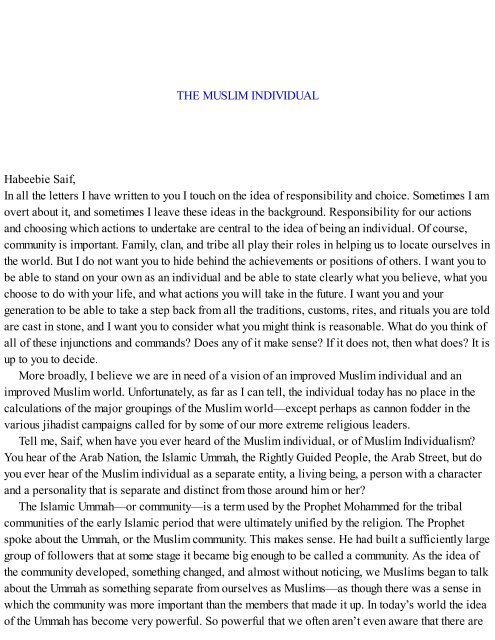1250119847
Create successful ePaper yourself
Turn your PDF publications into a flip-book with our unique Google optimized e-Paper software.
THE MUSLIM INDIVIDUAL<br />
Habeebie Saif,<br />
In all the letters I have written to you I touch on the idea of responsibility and choice. Sometimes I am<br />
overt about it, and sometimes I leave these ideas in the background. Responsibility for our actions<br />
and choosing which actions to undertake are central to the idea of being an individual. Of course,<br />
community is important. Family, clan, and tribe all play their roles in helping us to locate ourselves in<br />
the world. But I do not want you to hide behind the achievements or positions of others. I want you to<br />
be able to stand on your own as an individual and be able to state clearly what you believe, what you<br />
choose to do with your life, and what actions you will take in the future. I want you and your<br />
generation to be able to take a step back from all the traditions, customs, rites, and rituals you are told<br />
are cast in stone, and I want you to consider what you might think is reasonable. What do you think of<br />
all of these injunctions and commands? Does any of it make sense? If it does not, then what does? It is<br />
up to you to decide.<br />
More broadly, I believe we are in need of a vision of an improved Muslim individual and an<br />
improved Muslim world. Unfortunately, as far as I can tell, the individual today has no place in the<br />
calculations of the major groupings of the Muslim world—except perhaps as cannon fodder in the<br />
various jihadist campaigns called for by some of our more extreme religious leaders.<br />
Tell me, Saif, when have you ever heard of the Muslim individual, or of Muslim Individualism?<br />
You hear of the Arab Nation, the Islamic Ummah, the Rightly Guided People, the Arab Street, but do<br />
you ever hear of the Muslim individual as a separate entity, a living being, a person with a character<br />
and a personality that is separate and distinct from those around him or her?<br />
The Islamic Ummah—or community—is a term used by the Prophet Mohammed for the tribal<br />
communities of the early Islamic period that were ultimately unified by the religion. The Prophet<br />
spoke about the Ummah, or the Muslim community. This makes sense. He had built a sufficiently large<br />
group of followers that at some stage it became big enough to be called a community. As the idea of<br />
the community developed, something changed, and almost without noticing, we Muslims began to talk<br />
about the Ummah as something separate from ourselves as Muslims—as though there was a sense in<br />
which the community was more important than the members that made it up. In today’s world the idea<br />
of the Ummah has become very powerful. So powerful that we often aren’t even aware that there are
















